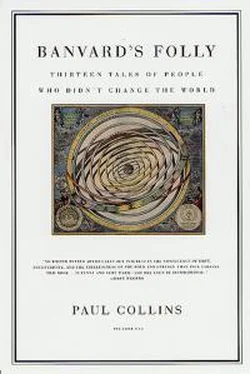Looking farther across the lunar plains, they saw palm trees, islands of shimmering quartz, and herds of miniature reindeer, elk, and zebra. Animals ranged in size from mice to a bear with horns, and included--most startlingly--the biped beaver. As tall as humans, the beavers walked upright, skating gracefully among their villages of tall huts, which all had chimneys, showing them to be acquainted with the use of fire.
As my more adept readers may have already guessed, there was something missing from this fantastic narrative--an elusive quality that we might call reality.
For the source of these articles was not Dr. Andrew Grant, but a gang of merry hoaxers at the New York Sun led by a certain Richard Adams Locke.
Locke was a brash young British expatriate, a descendant of the philosopher John Locke, and his schooling at Cambridge in the 1820's would have placed him in a hotbed of natural theology. The phenomenon of Dick and his ilk, whose works were being reprinted and parroted in American periodicals, was just too tempting for Locke to pass up. The 1820's had already brought at least two clumsily executed claims of life on the moon. With his university training though, Locke was able to imitate his instructors' rhetoric with perfect pitch.
Like any good hoax, Locke's began from reasonable-sounding premises. Dick's and Whewell's writings had already made alien life a plausible and maybe inevitable discovery. Herschel was a respected member of a famous family of astronomers, and he had in fact recently set up shop in South Africa. Still, for all their savvy, neither Locke nor Sun publisher Moses Beach (the father of future Scientific American publisher Alfred Beach) could have predicted the sensational nationwide impact of their "discovery." The circulation of the New York Sun leaped fivefold overnight, and Locke's articles were reprinted by newspapers across the country. Fellow journalists clamored for more details, and enthusiastic astronomers besieged ticket agents to book passages to South Africa. To top this media mayhem would be a challenge indeed--but Locke did not disappoint.
On August 28, the Sun reported the biggest scoop in the history of journalism: there were people on the moon. Or rather ... a sort of people: They averaged four feet in height, were covered, except on the face, with short and glossy copper-colored hair, and had wings composed of a thin membrane. ... In general symmetry of body and limbs they were infinitely superior to the orang outang. ... Some of these creatures had crossed this water and were lying like spread eagles on the skirts of the wood. We could then perceive that they possessed wings of great expansion, and were similar in structure to those of the bat. ... We scientifically denominated them as Vespertilio-homo, or man-bat; and they are doubtless innocent and happy creatures, notwithstanding that some of their amusements would but ill comport with our terrestrial notions of decorum.
These man-bats lived in a land of towering sapphire pyramids and were accompanied by flocks of doves. In their more relaxed moments, they could be seen picnicking on cucumbers.
Locke now had the nation's ear. In a time when many lands were as yet unmapped, such fantastic claims about another planet could be easily accepted.
The New York Times even pronounced the claims to be "probable and possible."
But really, we might ask, could Locke's fellow journalists have been that gullible? This comment from the New York Evening Post stands on its own as a reply:
That there should be winged people in the Moon does not strike us as more wonderful than the existence of such a race of beings on Earth ... [such as described by] Peter Wilkins, whose celebrated work not only gives an account of the general appearance of habits of a most interesting tribe of flying Indians, but also of all those more delicate and engaging traits which the author [Wilkins] was enabled to discover by reason of the conjugal relations he entered into with one of the females of the winged tribe.
Not surprisingly, at this point--if not well before--it dawned on Locke and Beach that all this attention could be worth a good deal of money. Following the distinct smell of lucre in the air, they set about printing up the articles in book form. The first printing of Great Astronomical Discoveries Lately Made by Sir John Herschel at the Cape of Good Hope quickly sold out its run of sixty thousand copies; pirated editions rushed in to fill the void.
Lithograph portraits of Lunarian creatures were sold to enthusiastic lunaphiliacs. The public couldn't get enough of it: congregations began taking up collections for missionaries to preach gospel to the man-bat race, and scalpers sold copies of the coveted book for tidy sums of cash.
Inevitably, Locke's time ran out. Astronomers seeking copies of his sources met with increasingly evasive replies, and they began to get suspicious.
Arriving ships showed no sign of the famous article by Dr. Grant in the Edinburgh Journal of Sciences. But in the end, vanity did the hoax in. Unable to contain himself, the star journalist revealed his grand prank to a colleague at the Journal of Commerce. He had fooled the whole nation!--and, of course, the friend was sworn to utter secrecy.
Locke awoke the next day to screaming headlines. And so on September 16--its chutzpah intact, if not its credibility--the New York Sun admitted to the hoax, but excused it on the outrageous grounds that it had performed a public service by "diverting the public mind, for a while, from the bitter apple of discord, the abolition of slavery." But if the Sun couldn't be bothered to come up with a better excuse, perhaps it was because Locke and Beach were too busy counting the small fortune they'd made off the whole absurd affair.
Dick was unamused. In a footnote to Celestial Scenery he huffs: The author of this deception, I understand, is a young man in the city of New York, who makes some professions as to scientific acquirements, and he may be perhaps disposed to congratulate himself. ... The Law of Truth ought never for a moment to be sported with. ... For when untutored minds and the mass of the community detect such an imposition, they are apt to call in question the real discoveries of science. ... It is to be hoped that the author of the deception to which I have adverted, as he advances in years and in wisdom, will perceive the folly and immorality of such conduct.
It was a fatherly wheeze worthy of Polonius, but Dick needn't have bothered.
Locke merrily hoaxed gullible suckers well into his golden years.
And they were suckers, as even Dick was to admit. Any half-educated reader should have realized that a supposed telescope with a magnification of 42,000X
would make the moon, a quarter million miles distant, appear about six miles away. "To perceive such objects [as animals]," Dick commented wryly, "it was requisite that they should have been brought within six yards instead of six miles."
Edgar Allan Poe, on the other hand, was quite tickled by the whole affair.
Writing in the October 1846 issue of Godey's Lady's Book, Poe thanked Locke for having whipped up a sales frenzy that ended up financing most of New York's penny newspaper presses. Poe was no stranger to successful hoaxes, as he had at least three to his credit--his own "Hans Pfall" moon hoax, the bizarre suspended animation of "M. Valdemar," and the past-lives scam of
"Mesmeric Revelation." Poe, often quick to accuse competitors of plagiarism, was warm in his praise of Locke.
Nonetheless, for a few years after the lunar hoax, Dick's ideas were quoted in popular periodicals of the day, and they gained a wider (if distorted) circulation through Locke's spoof. He also made his way anonymously into the hands of many unsuspecting readers. As I write, I have before me an 1846
Читать дальше











